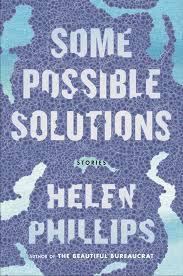 If you thought The Beautiful Bureaucrat was a strange book, Helen Phillips’ new book of short stories is even stranger, but it’s a really fun, and memorable read. These are short stories, almost vignettes in some places, experimental in others.
If you thought The Beautiful Bureaucrat was a strange book, Helen Phillips’ new book of short stories is even stranger, but it’s a really fun, and memorable read. These are short stories, almost vignettes in some places, experimental in others.
It’s always hard to review a book of short stories, but in this book you can see a number of common themes. One is the idea of repetition, of people mirroring each other. One of my favorite stories is about a new mother in a suburb, who discovers that she’s practically identical to every other new mother in town. It’s comforting because the women share their experiences, the good and the bad, with their infants, but it’s disturbing too. I can imagine that a new parent would go back and forth between thinking their baby is completely unique, and feeling like they’re doing the same thing all day that a million other parents are doing. As a non-parent, I found the idea really intriguing, especially since the idea of parenting is kind of “other” to me, a club I’m left out of, even if I never wanted to join.
The women threatened to overwhelm the café, these women with their strollers and sandals and sundresses, staked out at two large tables and encroaching upon a third. Mimosa struggled through the doorway with her stroller. She was stuck halfway in, halfway out, when it occurred to her that she could still escape. It could still be just her and The Queen, alone together.
These stories are a mix of science fiction and modern day life that’s just a little eerie. Like Bureaucrat, there’s a Twilight Zone quality throughout. Some stories are stranger than others, where some are just almost ordinary. The first story, called “The Knowers” was one of my favorites. It’s set in a future time where it’s possible to learn the date of one’s death. The question is whether you want to know or not. Another, called The Joined, is about a planet where it’s possible for two people to fuse themselves into one perfect hermaphroditic person, in total harmony. If you could live like that, would you? These stories seem to focus on possibilities, on choices. As one character says, “You always give something up to get something else.”
One of the most powerful stories has nothing futuristic or strange about it. “Life Care Center” is about a character who has to watch her sister dying in hospice. The sister is severely disabled, and can do little more than smile, eat and watch the same movie over and over again.
Suddenly you look away from the TV screen and stare straight into my eyes, absolving or interrogating or thanking or begging or parting. Why are you doing this? You never do this.
Sisterhood is a common theme, and parenting is another. There’s one story where a mother is convinced her children are aliens, and another story where two parents do their best to give their child joy in a difficult world. Phillips’ stories also contrast city life with suburban or rural life, as in “R” where two sisters leave their life as exotic dancers to go live on a farm, but their close relationship is tested.
I will say that some of the stories in the middle had me scratching my head. I suppose I prefer stories that have a more traditional narrative, although many of these stories do. Taken together, this is a compelling, diverse collection of stories with a lot of thoughtful ideas and vivid imagery and language. I definitely recommend it.

